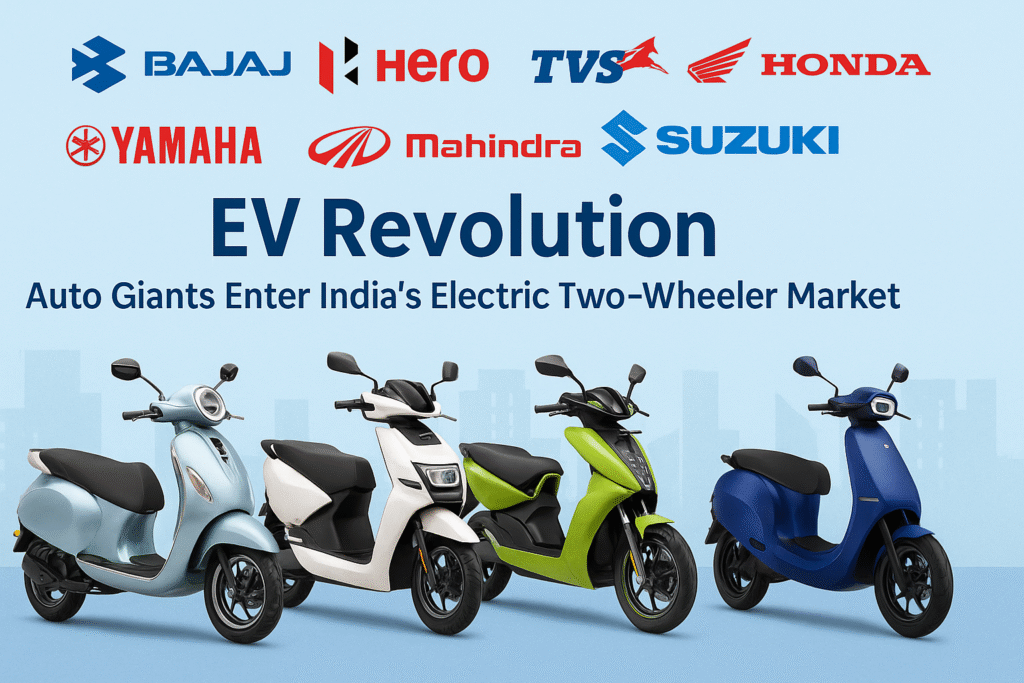The Indian electric two-wheeler market is witnessing a major transformation, with legacy automobile manufacturers and new-age startups aggressively stepping into the EV space. With rising fuel costs, government subsidies, and increasing environmental concerns, more companies are betting big on electric mobility — especially in the two-wheeler segment, which dominates the Indian roads.
Big Auto Companies Entering the EV Two-Wheeler Segment?
- Rising Fuel Prices: Consumers are looking for cost-effective commuting solutions.
Government Push: Schemes like FAME II, state-level subsidies, and tax incentives are making EVs more affordable.
Growing Infrastructure: More charging stations, better batteries, and extended ranges are reducing buyer hesitation.
Market Demand: The demand for electric scooters and bikes is growing exponentially — making it a lucrative market for manufacturers.
Bajaj Auto – Rebirth of Chetak
Bajaj Chetak marked the company’s grand re-entry into the scooter market in an electric avatar.
Model: Bajaj Chetak Urbane, Premium, and TecPac variants.
USP: Retro styling, metal body, reliable performance.
What’s Next: Bajaj is also working on expanding its EV lineup and has partnered with Yulu for battery swapping services.
TVS Motor Company – Leading with iQube
TVS has been an early entrant among traditional brands with its iQube Electric.
- Model Range: iQube 3.4 kWh, ST 5.1 kWh variant.
- USP: Smart connectivity, solid build, competitive pricing.
- Expansion: TVS plans to invest ₹5,000 crore in EV development and expand its iQube presence to 100+ cities.
Hero MotoCorp – Back with VIDA
Hero MotoCorp, India’s largest two-wheeler manufacturer, launched a new brand – VIDA for its EV journey.
First Model: VIDA V1 Plus, Pro.
Features: Removable battery, fast charging, smart app features.
Vision: Hero is planning to create a complete EV ecosystem with charging stations, battery swapping, and financing options.
Suzuki Motorcycle India – Electric Burgman in Development
Suzuki has confirmed plans to electrify its popular Burgman Street scooter.
Expected Launch: 2025 (prototype already spotted in testing).
Focus: Urban mobility, sleek design, and reliability.
Outlook: Suzuki is cautious but serious about entering the EV segment with a performance-oriented scooter.
Honda Motorcycle & Scooter India (HMSI) – Activa Goes Electric
Honda, known for the iconic Activa, is finally joining the EV race.
Upcoming Model: Activa Electric (codename – ‘EM1 e:’).
Launch Timeline: Expected by FY 2025.
USP: Trusted brand, battery swapping model with Honda Mobile Power Pack.
EV Focus: Honda aims to launch multiple EV models by 2030.
Yamaha – Silent But Strategic Entry
Yamaha is gearing up for the Indian EV market by testing its global EV models locally.
Likely Model: Yamaha E01 and Neo’s.
Strategy: Focus on premium urban scooters with connected tech.
Launch Expected: 2025-26.
Global Experience: Yamaha’s stronghold in performance bikes and scooters gives it an edge.
Mahindra Group – Through Peugeot and B2B EVs
Mahindra may not be visible with a mainstream EV scooter yet, but it owns Peugeot Motocycles, which is developing electric two-wheelers.
Also involved in: Last-mile delivery EVs via Mahindra Electric.
Future Plans: Likely to re-enter the two-wheeler EV segment directly or through partnerships.
LML – Revival as an EV-Only Brand
LML, once a household name in India, is making a comeback with an electric twist.
Upcoming Models: LML Star (electric scooter), LML Moonshot (e-bike).
Tech Focus: Smart features, aggressive design, urban youth targeting.
Outlook: Aimed at blending retro legacy with modern EV tech.
